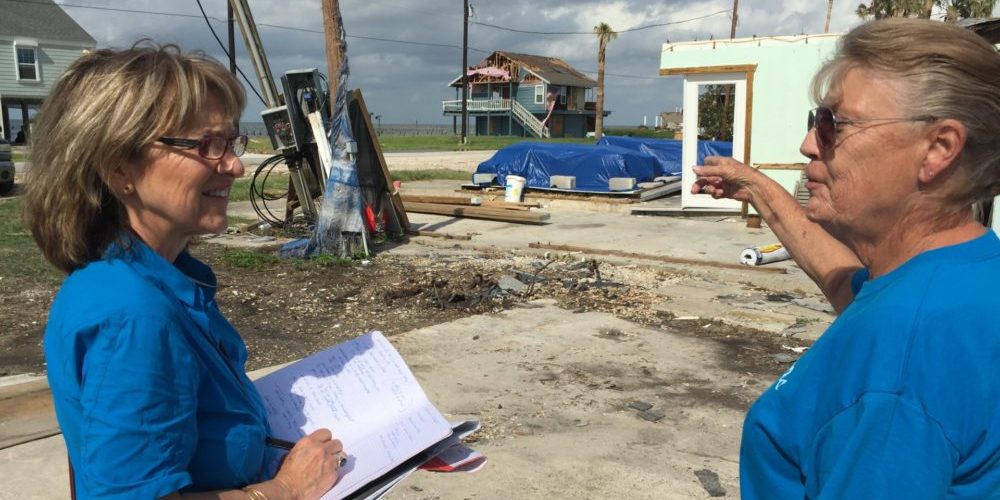
Recognizing Kate Browne: “What lights you up?”
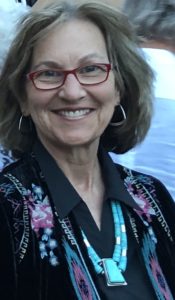 Following a 27-year career as an anthropologist and university professor at Colorado State University, Kate Browne recognizes the importance of finding one’s professional spark.
Following a 27-year career as an anthropologist and university professor at Colorado State University, Kate Browne recognizes the importance of finding one’s professional spark.
“I have always said to students that when you encounter something you enjoy thinking about, or a subject that lights you up from the inside, find a way to translate this into a career,” said Browne, a University Distinguished Professor in the Department of Anthropology and Geography, who retired this past May. “Because we all face hard times, and if you’re doing work you love, it can help you through those times like a dear friend.
“After I graduated from college with an English major, I didn’t know what to do with myself, and the path forward was a little rocky,” Browne recalled. “I loved community organizing, but then had to find a job that could pay my bills.”
Browne’s degree and writing skills landed her a high-paying job with a marketing firm and she even considered going into business for herself, but she longed for intellectual stimulation and more meaningful work. So, at the age of 34, she returned to school for a Ph.D. in Anthropology. According to Browne, once she figured out that anthropology approached research in a big, holistic way and with a powerful toolkit, she never looked back.
“The moment I made a 90-degree-turn to graduate school, I have embraced my career with all the delight and energy I am capable of,” Browne said.
Shining through Accomplishments
Browne’s energy and delight have inspired a career of excellence and path-breaking work that has been recognized in her discipline and at the University.
“I feel lucky to have been chair of the department during the time that Kate was nominated for some of the highest honors and awards given by our profession and CSU,” said Department of Anthropology and Geography Chair and Professor Mica Glantz. “I got to see firsthand how many students, professionals and community members Kate has impacted during her career.”
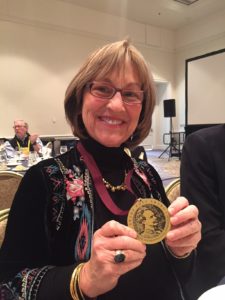
In 2018, Browne was named recipient of the Franz Boas Award, the highest award conferred by the American Anthropological Association recognizing anthropologists whose careers “demonstrate extraordinary achievements that have well served the anthropological profession.” Browne’s nomination identified her exceptional portfolio of scholarship, teaching, mentoring, public anthropology and leadership in the profession.
“I was flabbergasted,” Browne said of receiving the award. Boas recipients, including Margaret Mead, Claude Levi-Strauss and Sherry Washburn, are the giants in the field. “I could not imagine how I could be among them. It’s so humbling to be nominated by your peers, the very people you respect and admire most.”
In 2019, Browne received the highest academic recognition from CSU, the title of University Distinguished Professor. Her teaching awards include the Best Teacher Award (2011) from the CSU Alumni Association and the endowed Ann Gill Excellence in Teaching Award (2016). She has also received a dozen research grants as principal investigator from National Science Foundation (NSF), given a Distinguished Lecture to NSF and been awarded research grants from FEMA, Fulbright and the French government.
Browne’s best-known publications include three influential scholarly books, two documentary films broadcast by PBS stations and global satellite TV, dozens of peer-reviewed articles and a variety of major research reports for FEMA and emergency managers.
What’s her secret? “It’s easy to hold high standards in research and teaching when you believe your discipline matters vitally to the world,” Browne said. “Anthropological research is exciting because we integrate social theory and grounded methodologies, and that combination can throw light on some of the world’s most complex problems. And through the lens of culture, we can also spot solutions to many problems.”
Exploring Disaster Anthropology
Browne brought that approach to design an anthropological study after Hurricane Katrina in 2005. At the time, her research was focused on colonial legacies in the contemporary French Caribbean.
“I was working on a documentary film about Afro-Creole women entrepreneurs in Martinique when I watched in horror the images of the city of New Orleans drowning,” remembered Browne. “I tabled the film project and moved swiftly to design new research to foreground the cultural patterns of Afro-Creole families, asking how large, interdependent families, like those I had encountered in Martinique, would handle a disaster like Katrina.”
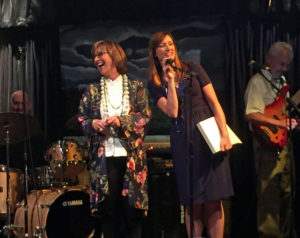
Browne got an NSF award, and with a filmmaker, located a displaced African-American family of more than 150 people who had evacuated New Orleans together before the storm. Her landmark research documented the historical adaptations for large African-American families who had lived in the same place for five generations, all the way back to their enslaved ancestors.
“My data revealed a glaring and toxic disconnect between those who had been wounded by the disaster and the outside agencies who were dispatched to help their recovery,” Browne said.
“Kate is one of the most creative scholars I’ve ever known,” said Lori Peek, Director of the Natural Hazards Center at University of Colorado, Boulder, who has collaborated with Browne. “Her book, Standing in the Need, has made an enormous contribution to the social scientific study of disasters and will be read by generations of scholars.”
Embracing the Land-Grant Mission with Real-World Solutions
Following her Katrina research, Browne initiated work to advance public scholarship in the world of disaster studies. In 2016, she co-hosted an NSF-funded workshop at CSU to bring together disaster social scientists and practitioners to discuss how to reduce unnecessary suffering. The workshop led her to co-found and co-direct the Culture and Disaster Action Network (CADAN), composed of 17 academics and practitioners who collaborate and share expertise to help national and international agencies integrate local, cultural comprehension into disaster practice.
Browne’s solutions-oriented scholarship has also infused her love of teaching.
“In undergraduate classes, I emphasize the importance of public anthropology, research that can be understood by and used to help broader publics,” she said. “That kind of work takes nudging students out of their comfort zones to tackle assignments for different kinds of publics – like writing op-eds for newspapers or producing podcasts.”
The approach has resonated with and challenged students.
“I’d never considered writing a blog, submitting to a newspaper or making a podcast before!” said Amanda Kowalski, a double major in Anthropology and Geography who took Public Anthropology and Global Environmental Challenges (ANTH 405) with Browne in Fall 2020. “I remember reading the syllabus, seeing the deliverables for the class and thinking, ‘What have I gotten myself into?’ But at the same time, the enormity of those problems invites innovation for equally enormous solutions.
“Here I am, a semester later, with solid accomplishments that developed my professional resume and boosted my confidence as a writer and a speaker,” Kowalski added. “I wish I could make every person in my life take this class.”
Browne’s Methods in Cultural Anthropology class (ANTH 441) also carried on her initiative for real-world projects and solutions in Spring 2021, collectively producing a report on how COVID has impacted people across different livelihood categories, from healthcare to food services to arts and music, in Fort Collins.
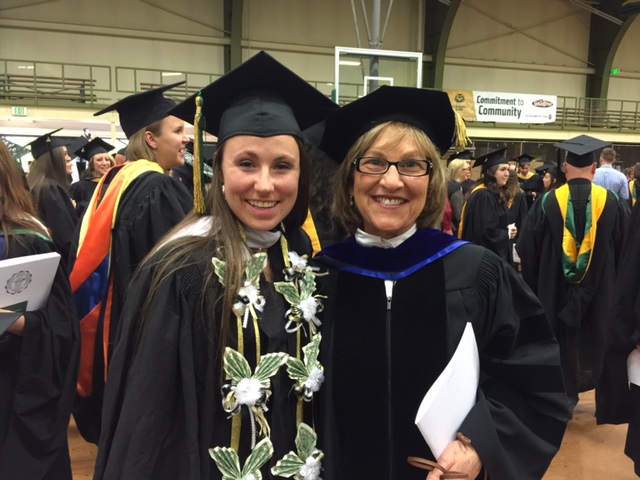
Other faculty have found inspiration through her example, too.
“What I have always admired about Kate is her deep curiosity and empathy,” said CSU Cultural Anthropology Professor Adrienne Cohen. “She cares so much about the people and topics she engages that one cannot help but be intrigued. That’s also what makes her a great teacher, thinker and mentor. I have learned a lot from watching Kate in action. “
“The Ethnographic Field School was one of the great highlights of my career, and I think created an exceptionally positive experience for students,” Browne said.
Students worked eight hours a day, six days a week in the heat of a Texas summer, going door to door in three Rockport neighborhoods to interview residents. They learned to collaborate, one of Browne’s priorities, and rely on each other’s strengths. In 2018, Browne conceived and organized the nation’s first Ethnographic Field School for Risk and Disaster, which she directed in Summer 2019 on the campus of Texas A&M University in Corpus Christi on the Texas Gulf Coast. Through the four-week field school, 15 CSU undergrads conducted firsthand research with residents of Rockport, Texas, who had survived the landfall impact of Hurricane Harvey in 2017.
“In the end, they gave a stellar presentation of their findings to a packed audience at the public library,” Browne said. “And that fall, they completed a 45-page public-facing document about the data, their analysis and its significance to the field.”
A peer-reviewed article also came out of the work.
“The Ethnographic Field School completely altered my career trajectory and exposed me to a completely different way of thinking and doing,” said Maizie Anders, a CSU political science major who participated in the program. “The field school exemplified the importance of working with and learning from communities rather than acting on their behalf. The field school made it clear that bottom-up approaches are crucial, and an anthropological lens is critical when addressing disaster preparedness, response, and recovery efforts.”
Anders has since shifted her academic focus toward disaster preparedness and emergency management and continues working with Browne who is her Honors Thesis Advisor.
“It is difficult to put into words all of the reasons that Dr. Browne is unique and special,” Anders added, “but I think it is her passion and sincerity that make me feel supported in all of my endeavors. She is incredibly knowledgeable and cares immensely for her students and those she works with.”
Boosting Research and Reach — and Looking Ahead
In addition to her teaching and research, Browne has served in a number of leadership roles in her field. In 2011, she was elected President of the Society for Economic Anthropology (SEA) where she had been a longtime member. She took over a society with declining membership on a platform of structural change. She proposed a new home under the umbrella of the American Anthropological Association and co-founded a new online journal, Economic Anthropology.
“The membership of our scholarly society has more than tripled, and the vitality of this wonderful organization of scholars is at an all-time high,” said Browne who served as editor of the new journal for two years. In 2021, just eight years after its founding, Economic Anthropology, earned the highest impact factor of all 44 journals in the discipline, surpassing the flagship journals American Anthropologist and American Ethnology.
“Kate’s work exemplifies many of the ways anthropologists are able to create positive change through community and government partnerships that ultimately improve the lives of individuals,” Glantz said.
Not surprisingly, Browne isn’t planning to slow down too much as she steps away from teaching at CSU. In the summer of 2021, she led a CADAN COVID-19 vaccine equity project funded by FEMA to better understand why some people are vaccine-hesitant and what patterns appear in that hesitancy. She concluded the project with a 40-page research report with actionable recommendations. In Summer 2021, she also received NSF funding for a 2022 workshop to advance theory about the culture of bureaucracy in disaster practice.
“It’s hard to express how grateful I am for my incredible colleagues and collaborators who have helped me become a better, more caring and aware anthropologist,” said Browne (see sidebar below). “None of us excels without support from all kinds of people.”
“I am grateful for so many people at CSU who never receive the recognition they deserve. Over the years, I’ve gotten to know such kind and generous and capable people all over campus — people in Morgan Library, ACNS, Facilities, TILT, the Dean’s Office, and my own department. The amount of talent packed into the faculty and staff at this university is just dazzling.
I am also grateful for the institution of Colorado State University and especially my home department of Anthropology and Geography. My life as a professor has relied on this high-functioning environment where I have enjoyed great freedom to be curious, creative, and bold.” – Kate Browne